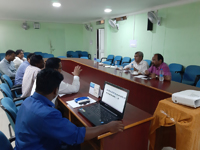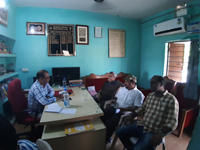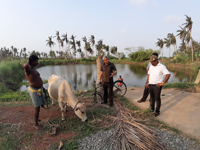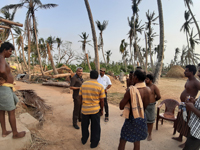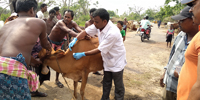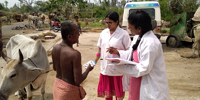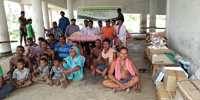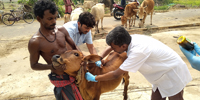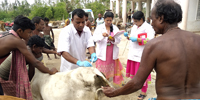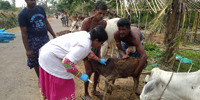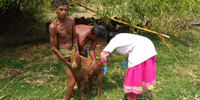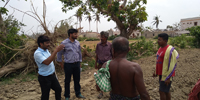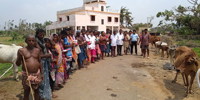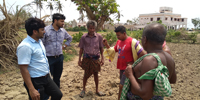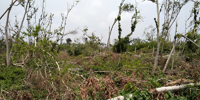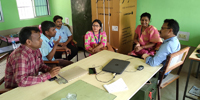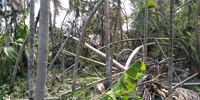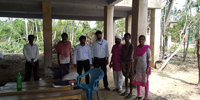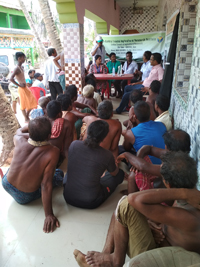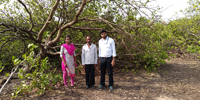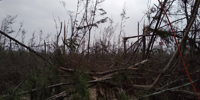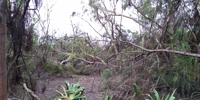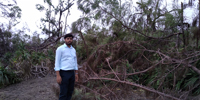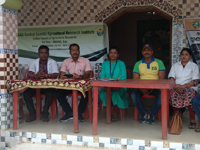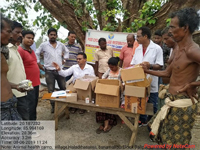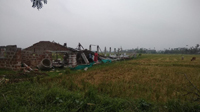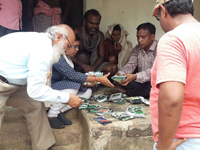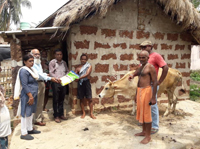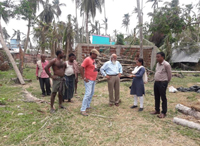
ICAR-CCARI, Goa scientist’s visited Fani cyclone affected areas of Odisha
ICAR-CCARI, Goa scientist’s visited Fani cyclone affected areas of Odisha
The Director and a team of scientists from ICAR- Central Coastal Agricultural Research Institute, Old Goa visited cyclone ‘Fani’ affected areas of Puri and Khordha district of Odisha state from 29th May to 12th June 2019. A team of scientists comprised of different disciplines - natural resource management, horticulture and animal science. The team visited about 15 villages was visited by the team to assess the effect of Fani cyclone and to organize animal health camps, etc. a
Dr. E. B. Chakurkar, Director, ICAR-CCARI, Goa visited the ICAR - Central Institute of Freshwater Aquaculture, Bhubaneswar and KVK, Khorda and KVK, Puri for organization of the animal health camps. Sharing of the newly released rice varieties was a major point of discussion during the visit to ICAR – National Rice Research Institute, Cuttack. Discussions regarding collaborative research on coconut and cashewnut were done during visit to Odisha University of Agriculture and Technology, Bhubaneswar. The cylone Fani damage to the poultry industry and the mitigation strategies were discussed at Central Avian Research Institute, Bhubaneswar. He visited cyclone affected villages along with the officials of KVK, Puri.
It was a sight of utter despair on the faces of farmers which reflected the impact of cyclone Fani in their villages. Whether it is coconut, mango and vegetables or shade net structures or farm houses – everything is in a state of devastation. There was paucity of fodder for the animals and poultry sheds are blown off. Such was the scene when scientist interacted with the farmers in the villages who were now totally engrossed in the rebuilding of the resources they lost in the cyclone Fani, which lasted only for 4 hours at a speed of 240 km/h.
While accounting for the first hand information about the most devastating natural calamity, animal science scientists Dr. Sanjay Udharwar, Dr. Susitha Rajkumar, Dr. Nibedita Nayak, Dr. Chethan Kumar held the animal health camps for restoring health of livestock and also advised the farmers about the general animal health and nutrition management. About 10 animal health camps were conducted in six Fani cyclone affected villages of Puri and Khordha districts. During, the camps nearly 1700 animals (cattle, buffalo, sheep, goat, poultry, dogs) were treated for various ailments besides distribution of mineral mixture, dewormers and other feed supplements for the livestock.
Coconut plantation devastation was most conspicuous besides utter damage of cashew plantations, mango trees, banana plantations and the irreparable damage of protected cultivation structures which have surely put the farmers under the great economic stress and would require years to require the losses. Horticulture scientist Dr. A.R. Desai interacted with farmers and provided information on how quickly to restore and encash the potential of horticultural crops for stabilizing the economic condition. It was evident to ensure the scope of introducing commercially important mango, cashew and coconut varieties in such sensitive region prone to natural calamities for crop diversification to mitigate their impact. Integrated farming approach will greatly facilitate the farmers to overcome losses and stabilize the farm income. With a view to facilitate the farmers with quick returns, seeds of improved varieties of vegetables namely okra, gourds, tomato, chili, etc. were also provided to the farmers.
Damage to the windbreaks of casuarina, native vegetation and mixed casuarina - native vegetation was conspicuously seen in nearby the sea shore reas. As a part of policy, shelterbelts of the afore-mentioned vegetation were established by the Odisha State Government for protection from storm and cyclones. The shelterbelts of the field to protect the crop were devastated. Dr. G. R. Mahajan and Dr. Sujeet Desai visited the sites and observed that the casuarina monoculture were affected more compared to the native and mixed native – casuarina vegetation, indicating the need for emphasizing the adoption of the native vegetation and mixed vegetation planting than monoculture of the casuarina while restoring damaged and establishing new shelterbelts.
Dr. Sanjay Kumar Mohanty, Sr. Scientist and Head, Dr. Sumita Acharya, SMS (Home Sciences), Dr. Manas Ranjan Behera, SMS (Fishery), Dr. Sunita Rani Sethy, SMS (Agricultural Extension) of KVK, Puri and Dr. B.K. Banja (Farm Manager) and Dr. P. N. Ananth, Programme Coordinator, Mr. A.K. Dash, SMS (Horticulture) of KVK, CIFA, Khordha, provided liaison of ICAR-CCARI scientists with farmers of the affected village during the visit.
Veterinary medicines for the animal health camps were generously sponsored by Mr. Prashant Powar of Vetoquinol Animal Health, Mr Sudhir Shinde and his colleagues from Kolhapur of Intas Pharma, Mr. Somanath Shikalgar of Alivira Animal Health, Mr. Shrikant Joshi, Agencia Mandovi, Corlim, Goa. Dr. Biswas Ranjan Behera, Block Veterinary Officer, Sakhigopal, Dr. Jyoti Ranjan Mohanty, Block Veterinary Officer, Balanga, Dr. Prakash Biswas, Veterinary Assistant Surgeon, Balipatna of Department of Animal Husbandry and Veterinary Services and CIFA-KVKs, extended full co-operation for conducting the health camps in affected villages.
ICAR-CCARI Goa has made beginning for an effective linkage between the Institutes, local KVK’s (OUAT and CIFA) and the line departments of Odisha for addressing the unforeseen calamities like cyclone Fani in particular and exchange of technologies across coastal areas in general in the years to come for the better cause of the community.
